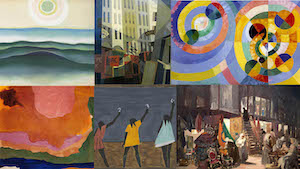Online Class: American Modernism ONLINE: The Other Modern Art
Modern Art, in general, was a reaction against the traditions of the past. European modernism started to take shape toward the end of the nineteenth century. “American Modernism” refers to an artistic and cultural movement in the United States that began at the turn of the twentieth century, with a core period between World War I and World War II. This 6-week program will examine American modernism’s greatest practitioners to discover its departures from European modernism and its unique brilliance.
Class 1 – Introduction: American Modernism — The Other Modern Art
This broad survey class will review developments in the European Modern Art to explain how and why American modernists forged a different and purely American interpretation of the modern. We will also look at the Armory Show of 1913 and its role in the development of American Modernism.
Sat., 9/26, 10am – 11am
Class 2 – The Ashcan School
Known for its gritty urban subject matter, dark palette, and gestural brushwork, the Ashcan School (formally known as the New York Realists) was a loosely knit group of artists based in New York City and founded by artist Robert Henri. A reaction against American Impressionism, this group believed in the worthiness of immigrant and working-class life as artistic subject matter and depicted the real rather than an elitist ideal. Artists to be examined include Robert Henri, William Glackens, George Luks, George Bellows and John Sloan, among others. Sat., 10/3, 10am – 11am
Class 3 – American Abstraction and Synchromism
This session explores American abstraction by pioneer artists such as Abraham Walkowitz and Arthur Dove. We’ll also look at developments such as synchromism by American artists such as Stanton MacDonald-Wright and Morgan Russell, whose approach to painting analogized color to music.
Sat., 10/10, 10am – 11am
Class 4 – The Harlem Renaissance
The Harlem Renaissance that emerged around 1920 was a prolific flowering of literary, visual, and musical arts within the African American community. The visual arts were one component of a rich cultural development that included many interdisciplinary collaborations. The goal was to inspire an African American culture based in pride and self-dependence and to create a keener awareness of its rich tapestry to the broader population. Artists to be examined include Aaron Douglas, Jacob Lawrence, Augusta Savage, Archibald Motley, and Loïs Mailou Jones, among others.
Sat., 10/17, 10am – 11am
Class 5 – Precisionism
Precisionism (sometimes known as Cubist Realism) was a style of American painting of the 1920s and 1930s characterized by abstracted forms, crisp contours, and static compositions. While the precisionists often depicted industrial or architectural subjects, their subject matter also included the American landscape and American regional culture. Artists to be examined include Charles Demuth, Charles Sheeler, Georgia O’Keeffe, and Joseph Stella, among others. Sat., 10/24, 10am – 11am
Class 6 – The End of American Art?
According to many art historians, “American Art”—as a designation—ended at World War II. After the international recognition of Abstract Expressionism, the art world became increasingly globalized and diffuse, with styles and trends practiced in all corners of the world. This notion was largely inspired by the tremendous number of artists who had fled to the United States to escape persecution in Europe. Recent scholarship, however, has focused on the transnational dialogues that occurred and tracing those back to create a richer understanding of the art of the United States. In this session we will explore some of the American Abstract Expressionists, Minimalists, and Pop Artists, to examine their connections to the American artistic tradition. Artists to be examined include Jackson Pollock, Lee Krasner, Mark Rothko, Helen Frankenthaler, Joan Mitchell, Clyfford Still, Robert Rauschenberg, Jaspar Johns, Andy Warhol, and Andrew Wyeth, among others. Sat., 10/31, 10am – 11am
Event Location and Ticket Information
Date: Saturday, September 26, 2020 - Saturday, October 31, 2020
Times: 10:00 am - 11:00 am
Ticket pricing:
Get tickets now
Presenter: Jill Kiefer, PhD

